Unit 5: Cognition
1/137
Earn XP
Description and Tags
Name | Mastery | Learn | Test | Matching | Spaced | Call with Kai |
|---|
No analytics yet
Send a link to your students to track their progress
138 Terms
memory
the persistence of learning over time through the encoding, storage, and retrieval of information
Application: retrieving your name, date of birth, general information
recall
a measure of memory in which the person must RETRIEVE information learner previously. Example: fill in the blank test
recognition
a measure of memory in which the person IDENTIFIES items previously learned. Example: multiple choice test
relearning
a measure of memory that assesses the amount of time saved when learning material again
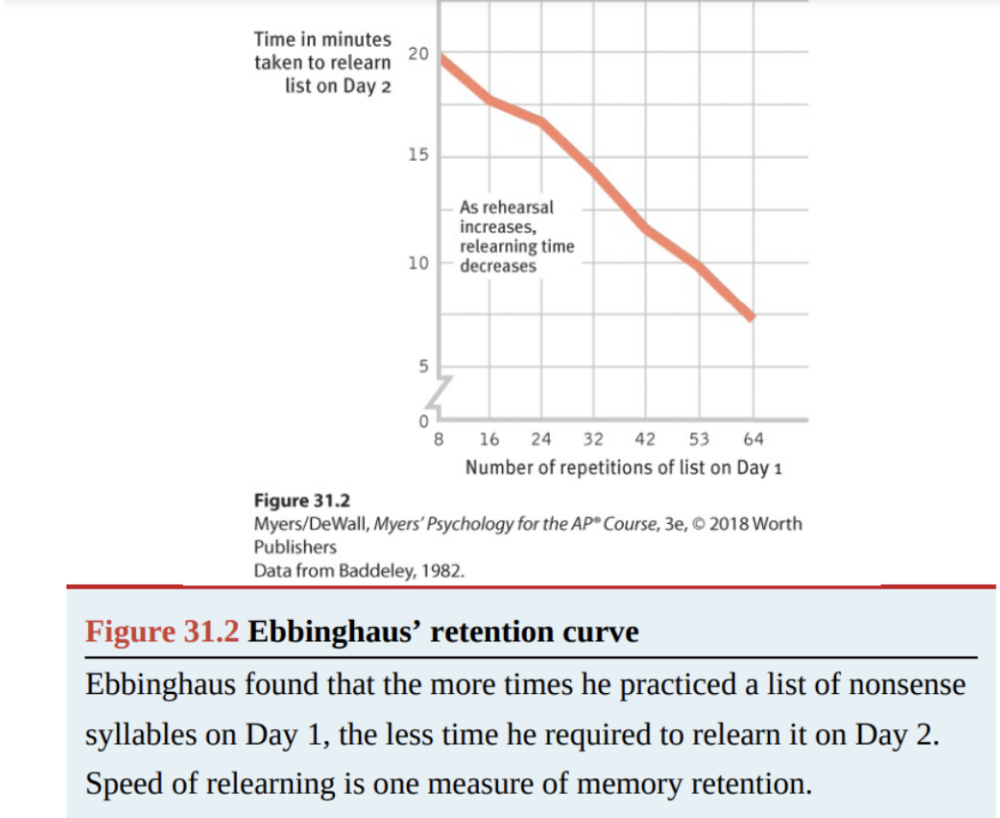
Ebbinghaus’ Retention Curve
Demonstrates the rate at which information is forgotten over time if we don’t attempt to retain it. Increadomh rehearsal causes relearning time to decrease.

Attkinson-Schiffrin’s Memory Model
Classic three step model showing us how memories are processed
Sensory Memory, Working Memory, Long term memory
What are the three stages in Atkinson-Schiffrin’s Memory Model
Information Processing Model
Encoding, storage, and retrieval are all part of the what model?
encoding
the process of getting information into the memory system. For example: by extracting meaning. Thinking of it like a word doc ___ is the action of typing in that information into the word doc
Storage
the process of retaining encoded information over time
Application: Keeping the information of the book in your mind
retrieval
the process of getting information out of memory storage
Application: Telling your friend how great that book was and summarizing it
parallel processing
processing many aspects of a problem simultaneously; the brain’s natural mode of information processing for many functions
Application: Perceiving a white board while hearing the teacher speak and knowing what the teacher is saying all at the same time
sensory memory
the immediate, very brief recording of sensory information in the memory system
Application: the taste of a birthday cake
working/short term emory
a newer understanding of short-term memory that adds conscious, active processing of incoming auditory and visual information, and of information retrieved from long-term memory.
Application: Learning how to drive for the first few years
long term memory
the relatively permanent and limitless storehouse of the memory system. Includes knowledge, skills, and experiences
Application: Knowing your childhood memories
explicit memory
retention of facts and experiences that one can consciously know and “Declare”. Also called declarative memory
Application: Knowing your name, your birthday, your immediate family
effortful processing
encoding that requires attention and conscious effort
Application: Listening to an AP Psychology review presentation
automatic processing
unconscious encoding of incidental information, such as space, time, and frequency and of well-learned information, such as word meanings
Application: Knowing that you are in class, sitting in a chair, next to a person
implicit memory
retention of learned skills or classically conditioned associations independent of conscious recollection. Also called nondeclarative memory
Application: Knowing how to walk, eat, speak
iconic memory
a momentary sensory memory of visual stimuli. A picture-image memory lasting no more than a few tenths of a second. Think EYE
Application: seeing a cat dash by and knowing that it is a cat
Echoic memory
a momentary sensory memory of auditory stimuli. If attention is elsewhere sounds and words can still be recalled within 3 or 4 seconds
Application: Hearing an unimportant message over the school PA system
Haptic Memory
a momentary sensory memory specific to tactile (touch) stimuli
Application: Creating VR systems with realistic tactile sensations to enhance immersion and realise
hierarchies groups
when we organize words or concepts into hierarchical groups, as 901 illustrated here with some of the concepts from this section, we remember them better than when information is presented at random.
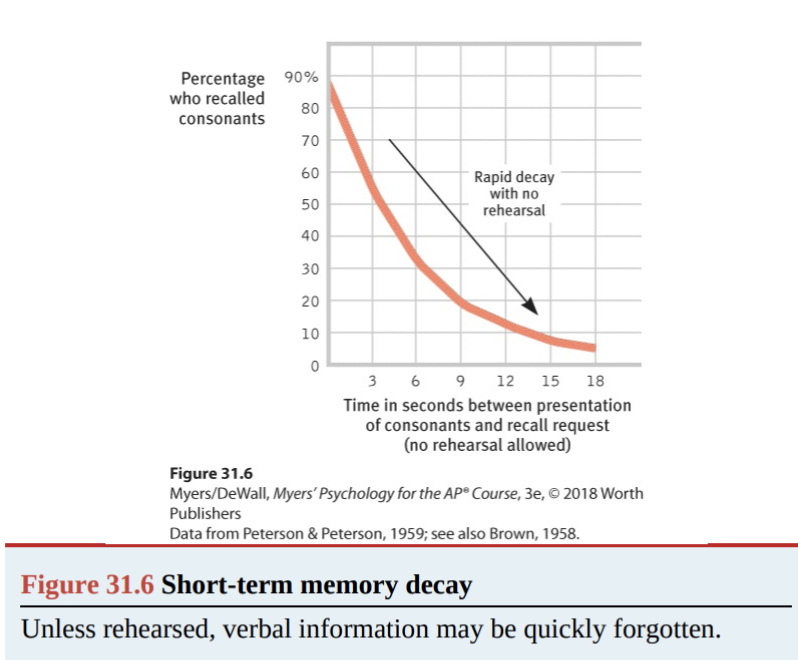
Short term memory decay
Chunking effect
organizing items into familiar, manageable units. Often occurs automatically., such as when you group together everyday items you need to have in your pockets before leaving the house (wallet, cash, phone, car keys, housekeys— chunk them together)
Application: Remembering long sequences of of numbers by breaking them down into smaller chunks
mnemonics
memory aids, especially those techniques that use vivid imagery and organizational devices. For me, I use the ____ of counting my knuckles as a way to help me remember which months have 31 days.
Application: PEMDAS, ROYGBIV
Spacing Effect
the tendency for distributed study or practice to yield better long-term retention that is achieved through massed study or practice
Application: Studying 1 hour a day for two weeks leading up to an exam to yield better results
testing effect
enhanced memory after retrieving, rather than simply rereading information. Also sometimes referred to as a retrieval practice effect or test-enhanced learning
Application: Taking Practice AP Exams
shallow processing
encoding on a basic level, based on the structure or appearance of words. Ex”: “chair” is the word in capital letters?
Application: Recognizing brand logos based solely on their visual appearance
Deep processing
encoding semantically based on the meaning of the words; tends to yield the best retention. Example: Doll.
Would the word fit in this sentence? The girl threw the ___ onto the floor
semantic memory
explicit memory of facts and general knowledge; one of our two conscious memory systems.
Example: The capital of france. Suppose you know that the capital of France is Paris. This knowledge is stored in your semantic memory. You didn't necessarily learn this information from a specific personal experience, but rather it is a general fact that you have acquired over time through education, reading, or exposure to information about geography.
Episodic memory
explicit memory of personally experienced events; one of our two conscious memory systems.
Recalling your highschool graduation. This knowledge is stored in your ___. You recall your highschool graduation through personal experience
Amygdala
Stores emotion-related memory information. The way you cried after your favorite book was ripped to shreds, the sad emotions were stored in this part of the brain
Frontal lobes and hippocampus
Parts of the brain that form explicit memory
Cerebellum and basal ganglia
Parts of the brain that form implicit memory
memory consolidation
the neural storage of a long-term memory
Flashbulb memory
a clear, sustained memory of an emotionally significant moment or event. For people who experienced 9/11, the event is likely a ___ memory because even decades later they have near perfect recall of the event. Remembering where they had been and what they were doing
longterm potentiation
an increase in a cell’s firing potential after brief, rapid stimulation. A neural basis for learning and memory
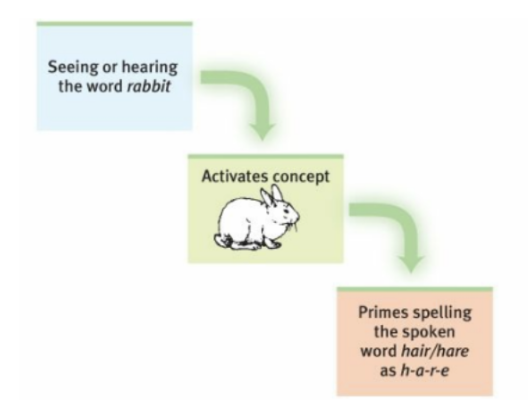
priming
the activation, often unconsciously, of particular associations in memory
Encoding specificity principle
the idea that cues and contexts specific to a particular memory will be most effective in helping us recall it.
Imagine you are studying for an exam in a specific room on campus (Room A) with a particular set of environmental cues, such as the smell of a certain air freshener, the color of the walls, and the sound of a humming air conditioner. According to the encoding specificity principle, your memory for the information you are studying will be enhanced if you are in a similar context when you take the exam.
mood congruent memory
the tendency to recall experiences that are consistent with one’s current good or bad mood.
Imagine a student who is feeling anxious and stressed due to upcoming final exams. While in this anxious state, they study for hours, feeling the pressure and worry about their performance. The information they encode during this study session becomes associated with the anxious mood they are experiencing.
Later, during the actual exam period when the student is again feeling anxious, the mood-congruent memory effect may come into play. The heightened state of anxiety can serve as a retrieval cue, making it more likely for the student to recall the information they studied while feeling anxious. In this scenario, the emotional state during encoding (anxiety) is congruent with the emotional state during retrieval (anxiety), enhancing the likelihood of remembering and accessing the studied material.
Context effect
a type of perceptual set in which our perceptions are affected by the context of a scenario
Imagine hearing a noise interrupted by the words “eel is on the wagon.” Likely, you would perceive the first word as wheel. Given “eel is on the orange,” you would more likely hear peel. In each case, the context creates an expectation that, top-down, influences our perception of a previously heard phrase |
State dependent memory
What we learn in one state—be it drunk or sober, happy or sad—may be more easily recalled when we are again in that state.
What people learn when drunk they don’t recall well in any state (alcohol disrupts memory storage). But they recall it slightly better when again drunk. Someone who hides money when drunk may forget the location until drunk again.
serial position effect
our tendency to recall best the last (Recency effect) and first (primacy effect) items in a list
primacy effect
our tendency to recall the first items on a list
recency effect
our tendency to recall the last items on a list
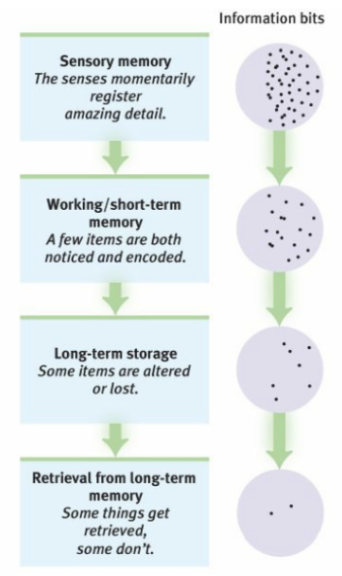
processing of forgetting
Anterograde amnesia
an inability to form new memories
Application: Being unable to form new memories after being hit on the head very hard
retrograde amnesia
an inability to retrieve information from one’s past
Application: Hitting your head very hard, and then forgetting your name, your family, your spouse
encoding failure
we cannot remember what we have not encoded
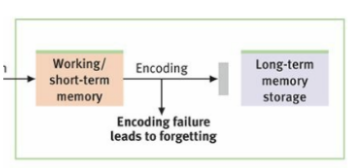
storage failure
even after encoding something well, we sometimes later forget it
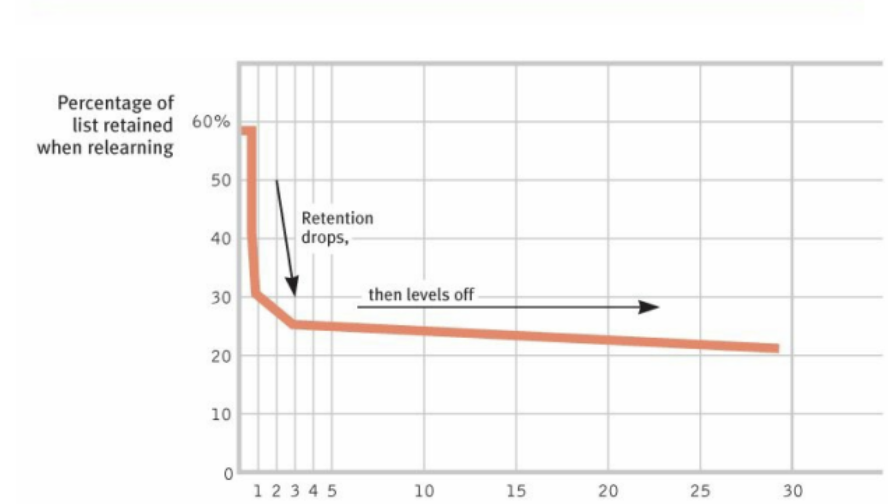
retrieval failure
sometimes even stored information cannot be accessed, which leads to forgetting
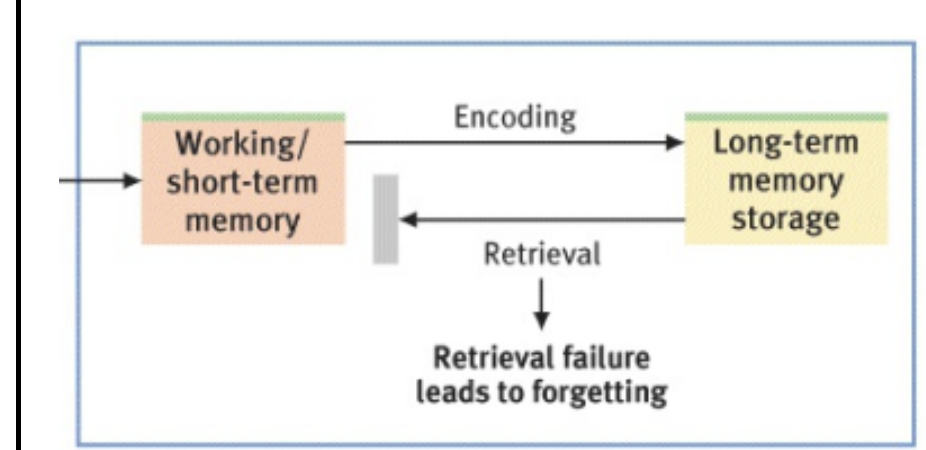
proactive interference
the forward-acting disruptive effect of older learning on the recall of new information. Forgetting new info because old info is interfering.
Imagine you are learning a new language and have previously learned the names of animals in a different language. For instance, you learned that "chien" means "dog" in French. Later, you decide to learn another language, say Spanish, and you discover that "perro" means "dog" in Spanish.
Due to ________, your prior knowledge of the French word "chien" might interfere with your ability to remember the Spanish word "perro." When trying to recall the Spanish term, the French word might come to mind first, impeding your ability to retrieve the correct information in the new language.
retroactive interference
the backward-acting disruptive effect of newer learning on the recall of old information. Forgetting old information because you’re learning new information
Imagine you are studying for a history exam, and you've spent a significant amount of time learning about the American Revolution. You've memorized key dates, events, and the prominent figures involved. However, a week before the exam, you start learning about another historical period, such as the Renaissance.
As you delve into the details of the Renaissance, the new information about this period may interfere with your ability to recall specific details about the American Revolution when you sit down to take the exam. The recently acquired information about the Renaissance may overshadow or disrupt the retrieval of details related to the American Revolution.
repression
in psychoanalytic theory, the basic defense mechanism that banishes from consciousness anxiety-arousing thoughts, feelings, and memories.
Imagine a person who experienced a traumatic event during childhood, such as a car accident. The individual may have witnessed something distressing, like the injury of a family member. In order to cope with the intense emotions and anxiety associated with this traumatic memory, the person unconsciously represses it.
Over the years, the individual may have difficulty recalling specific details about the accident, and they might not even remember witnessing the traumatic event. If asked about their childhood or the car accident, they may exhibit gaps in their memory or provide vague and incomplete information.
reconsolidation
a progress in which previously stored memories, when retrieved, are potentially altered before being stored again
Let's say you have a memory of a car accident. Over time, this memory may become associated with a great deal of fear and anxiety. However, you decide to undergo therapy to address your emotional response to the memory.
During therapy, you discuss the details of the car accident, recalling the sequence of events and the emotions you experienced. As you actively engage with and retrieve the memory, it becomes temporarily unstable or labile. At this point, interventions such as cognitive-behavioral therapy or exposure therapy can be applied to modify the emotional components of the memory.
Through this process, the emotional charge associated with the memory may be reduced or altered. The modified memory is then reconsolidated, and when you recall it in the future, it may evoke less fear and anxiety.
elizabeth Loftus
Demonstrated reconsolidation through her experiment:
Showed us a handful of individual faces that we were later to identify, as if in a police lineup. Then she showed us some pairs of faces, one face we had seen earlier and one we had not, and asked us to identify the one we had seen. But one pair she had slipped in included two new faces, one of which was rather like a face we had seen earlier. Most of us understandably but wrongly identified this face as one we had previously seen. To climax the demonstration, she showed us the originally seen face and the previously chosen wrong face and asked us to choose the original face we had seen. Most of us picked the wrong face! As a result of our memory reconsolidation, we—an audience of psychologists who should have known better—had replaced the original memory with a false memory.
misinformation effect
occurs when misleading information has distorted one’s memory of an event
source amnesia
faulty memory for for how, when, or where information was learned or imagined. (Also called source misattribution.) Source amnesia, along with the misinformation effect, is at the heart of many false memories
infantile amnesia
our inability to remember events that occurred before we were about 4 years old.
deja vu
that eerie sense that “I’ve experienced this before.” Cues from the current 965 situation may unconsciously trigger retrieval of an earlier experience.
Rehearse repeatedly
Activate retrieval cues
Use mnemonic devices
Minimize proactive and retroactive interference
Sleep more
Test your knowledge
What are the 7 strategies that help increase memories while studying
prototypes
a mental image or best example of a category. Matching new items to a prototype provides a quick and easy method for sorting items into categories (as when comparing feathered creatures to a prototypical bird, such as a robin).
A prototype for the concept of a bird might include features commonly associated with birds, such as wings, feathers, a beak, and the ability to fly.
concept
a mental grouping of similar objects, events, ideas, or people.
cognition
all the mental activities associated with thinking, knowing, remembering, and communicating.
creativity
the ability to produce new and valuable ideas
convergent thinking
narrowing the available problem solutions to determine the single best solution.
Divergent thinking
expanding the number of possible problem solutionsl creative thinking that diverges in different directions
Expertise
Imaginative thinking skills
A venturesome personality
Intrinsic motivation
A creative environment
Robert Sternberg’s 5 components of creativity
algorithm
a methodical, logical rule or procedure that guarantees solving a particular problem. Contrasts with the usually speedier—but also more error-prone—use of heuristics.
ex: PEMDAS
Heuristic
a simple thinking strategy that often allows us to make judgments and solve problems efficiently; usually speedier but also more error-prone than an algorithm.
Imagine you are trying to assess how safe a city is. If you recently read a news article about a crime that occurred in that city, the availability heuristic might lead you to overestimate the overall crime rate and perceive the city as less safe than it statistically might be. The vivid and easily recalled information (crime news) influences your judgment more than a comprehensive analysis of crime statistics would.
Insight
A sudden realization of a problem’s solution; contrasts with strategy-based solutions
confirmation bias
a tendency to search for info that supports our preconceptions and to ignore or distort contradictory evidence
fixation
in cognition, the inability to see a problem from a new perspective; an obstacle to problem solving.
mental set
a tendency to approach a problem in one particular way, often a way that has been successful in the past
intuition
an effortless, immediate, automatic feeling or thought, as contrasted with explicit, conscious reasoning
representative heuristic
estimating the likelihood of events in terms of how well they seem to represent, or match, particular prototypes; may lead us to ignore other relevant information.
You’ll buy this meal with noodles and red sauce, the prototype for spaghetti, and yet you ignore the other relevant information like the box label that claims it’s not spaghetti?
availability heuristic
estimating the likelihood of events based on their availability in memory; if instances come readily to mind (perhaps because of their vividness), we presume such events are common.
You’ll make dinner with something in the kitchen rather then going all the way to the store
overconfidence
the tendency to be more confident than correct—to overestimate the accuracy of our beliefs and judgments
Belief perseverance
clinging to one’s initial conceptions after the basis on which they were formed has been discredited.
framing
the way an issue is posed; how an issue is worded can affect decisions and judgments
language
our spoken, written, or signed words and the ways we combine them to communicate meaning
phoneme
in a language, the smallest distinctive sound unit.
Basically what you hear when you “sound it out”
grapheme
the way we write a phoneme in a language, the smallest unit that carries meaning; may be a word or a part of a word like a prefix
The word “readers,” for example, contains three morphemes: “read,” “er” (signaling that we mean “one who reads”), and “s” (signaling that we mean not one, but multiple readers).
grammar
in a language, a system of rules that enables us to communicate with and understand others.
Semantics is the language’s set of rules for deriving meaning from sounds, and syntax is its set of rules for combining words into grammatically sensible sentences.
Productive Language
the ability to produce words
Receptive Language
Understanding of information provided in a variety of ways such as sounds and words
Babbling stage
beginning around 4 months, the stage of speech development in which an infant spontaneously utters various sounds at first unrelated to the household 1033 language.
one-word stage
the stage in speech development, from about age 1 to 2, during which a child speaks mostly in single words.
two-word stage
beginning about age 2, the stage in speech development during which a child speaks mostly in two-word statements.
telegraphic speech
early speech stage in which a child speaks like a telegram—“go car”—using mostly nouns and verbs
Aphasia
impairment of language, usually caused by left hemisphere damage either to Broca’s area (impairing speaking) or to Wernicke’s area (impairing understanding)
Broca’s Aphasia
Leads to a struggle to produce speech. Individual conceptually understands what is being said to them, but struggles with verbalizing their responses.
Broca’s Area
helps control language expression—an area of the frontal lobe, usually in the left hemisphere, that directs the muscle movements involved in speech.
Wernicke’s Aphasia
Individual is able to produce speech properly, but does not understand/comprehend what is being said to them. tHERE IS A LACK OF UNDERSTANDING AND LANGUAGE comprehension that occurs.
Wernicke’s Area
a brain area involved in language comprehension and expression; usually in the left temporal lobe.
Linguistic Determination
the strong form of whorf’s hypothesis—that language controls the way we think and interpret the world around us.
Linguistic influence
the weaker form of “linguistic relativity”—the idea that language affects thought (thus our thinking and world view is “relative to” our cultural language).
Herman Ebbinghaus
Showed that our response speed when recalling or recognizing information indicates memory strength, as does our speed at relearning.
Richard Atkinson and Richard Schuffrun
proposed our three stage memory model